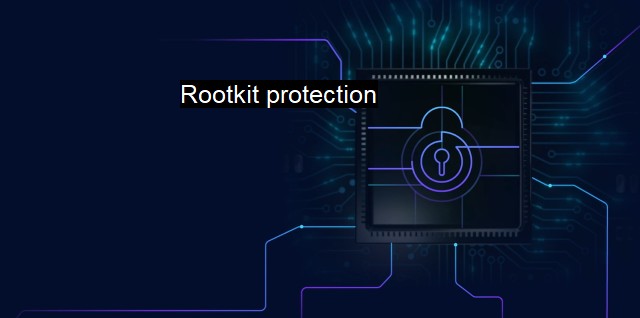What is Rootkit protection?
The Importance of Rootkit Protection in Today's Cybersecurity Landscape: Keeping Your System Safe from Malicious Software and Hackers
Rootkit protection is a crucial component in the area of cybersecurity and antivirus software programs. To comprehend the extent of its importance, it's essential to understand what precisely a rootkit is. A rootkit is a stealthy form of malware that conceals it from the system's infected user and antivirus software, enabling adversaries to maintain ongoing privileged access to the system. It's a harmful software packet that has two significant attributes: it has the ability to disguise itself, often remaining unnoticed for long periods, and can provide a threat actor extreme control over the victim's PC.Rootkits function by embedding themselves deep within a system's core, beneath the operating system level, and manipulating the system to hide their presence. Because they operate at such a concealed level, they can typically steer clear of regular antivirus detection techniques, making them specifically troublesome and perilous.
This is where rootkit protection comes into play. Rootkit protection is an essential aspect of antivirus software aimed at detecting and eliminating rootkits. It's incorporated into several software security programs to counteract the severe threats posed by rootkits. To achieve this, rootkit protection employs numerous methods, strategies, and technologies.
One technique is behavioral-based detection, which watches for the actions or actual performance of programs or system elements to identify possible malicious activities, rather than solely looking for known threats. This method is primarily valuable in identifying new or unique rootkits that conventional antivirus software may miss.
Rootkit protection also entails the deployment of a specialized rootkit scanner. Such scanners run deep system scans, rumbling through layers that traditional antivirus scanners cannot reach, searching for any obscured or concealed rootkit files. Precisely because rootkits perform at such a granular level, your standard antivirus scanner may not be fit to locate and eliminate them, hence the necessity for a dedicated rootkit scanner.
Another critical aspect of rootkit protection is conducting regular system sweeps for known rootkit signatures because many rootkits share habits, codes, or 'signatures.' Rootkit protection software will use these signatures to reveal rootkits hiding within a system.
Some advanced rootkit protection mechanisms integrate artificial intelligence (AI) and machine learning. This technology enables the antivirus software to progressively learn what a rootkit looks like and how it behaves much more swiftly, enhancing the software's capacity to detect and eliminate these threats.
It’s not just about identification and removal; modern rootkit protection strategies emphasize preventing rootkits from infecting the systems in the first place. This prevention-centric approach is beneficial because the longer a rootkit remains in a system, the more severe damage it can inflict. Antivirus programs that provide proactive rootkit protection often incorporate real-time monitoring systems. They continually scrutinize system processes and behaviors to detect any signs of rootkit activities early and immediately initiate defensive actions.
Rootkit protection is pivotal in today's cybersecurity environment, not only for businesses but also for individual users. With rootkits becoming more complex and harder to spot, having layers of rootkit protection that can proactively guard, detect, and cleanse is fundamental. By understanding the mode of operation of rootkits and the strategies offered by rootkit protection, users could fortify their systems against these invisible yet tremendously destructive cyber threats, thereby ensuring maximum system protection.

Rootkit protection FAQs
What is a rootkit and why is it a threat to my cybersecurity?
A rootkit is a type of malware that is designed to stealthily gain access to a computer system and remain undetected. Once installed, a rootkit can give hackers complete control over your computer, enabling them to steal sensitive information, monitor your activity, and carry out other malicious activities. Rootkits are a serious threat to your cybersecurity because they can be difficult to detect and remove.What are some common signs that my computer may be infected with a rootkit?
Some common signs of a rootkit infection include slow performance, unexplained crashes, new and unexpected programs on your computer, and changes to your browser settings. You may also notice that antivirus programs or other security measures are disabled or not working properly.What steps can I take to protect my computer from rootkits?
To protect your computer from rootkits, it's important to use a reputable antivirus program and keep it up-to-date. You should also be cautious about downloading and installing programs from unknown sources, and avoid clicking on links or opening email attachments from suspicious sources. Regularly updating your operating system and other software can also help to prevent rootkits from exploiting vulnerabilities in your system.What should I do if I think my computer is infected with a rootkit?
If you suspect that your computer is infected with a rootkit, the first step is to run a full scan with your antivirus program. If the scan detects any malicious files, you should follow the instructions provided by your antivirus program to remove them. In some cases, however, rootkits can be difficult to detect and remove. In this case, you may need to seek the assistance of a cybersecurity professional who has experience with rootkit removal.| | A | | | B | | | C | | | D | | | E | | | F | | | G | | | H | | | I | | | J | | | K | | | L | | | M | |
| | N | | | O | | | P | | | Q | | | R | | | S | | | T | | | U | | | V | | | W | | | X | | | Y | | | Z | |
| | 1 | | | 2 | | | 3 | | | 4 | | | 7 | | | 8 | | |||||||